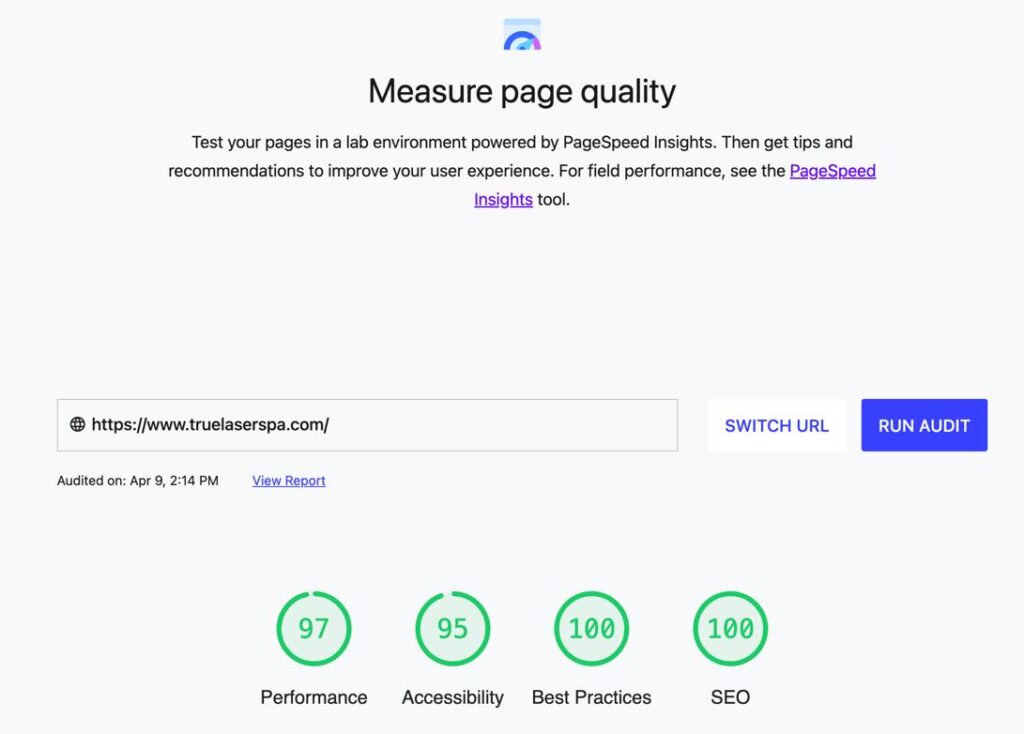For doctors, clinics, and healthcare providers, page speed for medical websites is one of the most critical factors for online success. Simply put, page speed refers to how quickly your website loads when a patient or visitor clicks on it. A fast-loading site ensures that patients can access important information, book appointments, or read educational resources without frustration.
Slow websites, on the other hand, can harm both Medical SEO Services and patient trust. When pages take too long to load, visitors are more likely to leave, increasing bounce rates and reducing engagement. This directly affects how Google ranks your site, meaning your clinic could appear lower in search results compared to faster competitors.
Healthcare providers in cities like New York City, Los Angeles, Chicago, Houston, Philadelphia, and Dallas need to prioritize page speed not only for better search rankings but also to provide a seamless patient experience. By optimizing your website’s performance, you can improve online visibility, patient satisfaction, and ultimately, appointment bookings. Learn more about boosting your search presence with professional Medical SEO Services.

Why Page Speed Is Critical for Healthcare Websites
For healthcare providers, website performance isn’t just a technical issue—it directly affects how patients find and interact with your practice. Faster websites improve Medical SEO Services rankings by signaling to search engines like Google that your site offers a high-quality experience. Clinics that invest in page speed optimization are more likely to appear at the top of search results, attracting more patients and increasing online visibility.
Slow-loading websites, however, can frustrate visitors, increasing bounce rates and reducing the chances that patients will book appointments or read your educational content. For pediatric clinics, cardiologists, and OB/GYN practices, fast-loading pages are essential to help patients in cities such as San Diego, Phoenix, and San Antonio quickly access the information they need.
Optimizing page speed also enhances the overall patient experience. Visitors are more likely to engage with content, schedule appointments, and trust your services when pages load smoothly. For clinics seeking professional guidance, leveraging Medical Website Optimization services can provide a significant advantage in today’s competitive healthcare market.
Impact on Search Engine Rankings
Google considers page speed a key ranking factor, meaning faster websites have a better chance of appearing at the top of search results. For instance, practices offering SEO services for internal medicine practice in NYC can benefit from faster load times, boosting visibility and attracting more patients online.
Enhancing Patient Experience
Faster pages lead to higher engagement. Telemedicine providers in Houston and nutritionists in New York see better patient interaction and increased inquiries when their websites load quickly. Patients can navigate your site with ease, read educational materials, and book appointments without frustration, which builds trust and strengthens your practice’s online reputation.
Common Issues with Page Speed for Medical Websites
Many healthcare websites suffer from slow load times due to common technical issues that can easily be overlooked. Large images, unoptimized videos, and heavy PDF files often take longer to load, frustrating patients and hurting your Medical SEO Services efforts. Clinics and hospitals in busy cities like Chicago, Los Angeles, and Dallas need to ensure their media content is optimized for speed to maintain high engagement.
Excessive plugins and scripts are another frequent problem. While plugins add functionality, too many can slow down your site and cause conflicts. Regularly auditing and updating your CMS, themes, and plugins ensures that your website remains fast and reliable for visitors.
Finally, poor hosting or slow server responses can drastically affect page speed. Even well-optimized websites will load slowly if the server is not capable of handling traffic efficiently. Partnering with experts in On-Page for Medical Website Optimization ensures that your hosting environment and website infrastructure are optimized for maximum speed and performance.
High-Impact Media for Healthcare Content Marketing
Videos, images, and downloadable PDFs can significantly increase page load times. Compressing media files and using modern formats like WebP for images can reduce load times and improve both SEO and patient experience.
Outdated CMS or Plugins
An outdated content management system (CMS) or plugins can slow down your website and create security vulnerabilities. Regular updates are essential for smooth website performance and to maintain high Medical Website Optimization standards.
Slow Hosting Providers
Choosing a low-quality hosting provider can undermine all other optimization efforts. Fast, reliable hosting ensures that your site loads quickly for patients in all major cities, including Houston, Philadelphia, and San Diego, and allows you to fully leverage professional Medical Website Optimization services.
Strategies to Improve Page Speed for Doctors and Clinics
Optimizing page speed is crucial for medical websites to enhance both patient experience and Medical SEO Services performance. Several strategies can help clinics, hospitals, and private practices ensure their website loads quickly across all devices and platforms.
One of the most effective methods is image compression and lazy loading. Heavy images and videos can significantly reduce page speed. By compressing files and using modern formats like WebP, healthcare providers can maintain high-quality visuals without compromising speed. Lazy loading ensures that images and videos load only when a patient scrolls to them, further reducing initial load times.
Mobile optimization and responsive design are essential, as many patients access healthcare websites via smartphones or tablets. A responsive website ensures consistent performance across devices, enhancing user engagement and supporting higher rankings for Medical SEO Services.
Reducing unnecessary scripts and CSS also significantly improves page speed. Excessive code can slow rendering and annoy users. Regularly auditing your website for unused scripts, plugins, and redundant CSS helps maintain optimal performance.
For healthcare providers seeking expert support, professional Medical Website SEO Audit and Medical Website Design and Development services ensure that your website is fast, efficient, and fully optimized for patient engagement.
Optimize Images and Videos
Use next-gen formats like WebP for images and compress large video files to reduce load times without sacrificing quality. Optimized media improves page speed and keeps patients engaged.
Implement Caching and Minification
Enable browser caching and minify CSS, JavaScript, and HTML files to speed up website load for repeat visitors. This strategy helps clinics and hospitals maintain high-performance Medical SEO Services across all pages.
Mobile-Friendly Design
Ensure your website adapts seamlessly to mobile and tablet devices. Fast, responsive design enhances patient expert
How Page Speed Boosts Patient Acquisition and Engagement
A fast-loading medical website does more than improve search rankings—it directly impacts patient acquisition and engagement. When pages load quickly, prospective patients can easily navigate your site, read educational content, and schedule appointments without frustration. This seamless experience encourages more inquiries and builds trust in your practice.
For example, concierge doctors in Houston and orthopedic surgeons in Las Vegas benefit from faster websites because patients can instantly access service information, book consultations, and view educational resources. A slow website, in contrast, may cause potential patients to leave before completing these actions, reducing appointment conversions.
Improving page speed enhances both medical local SEO and Google Business Profile performance. Ensuring fast load times across your website helps strengthen your online presence, improve local search visibility, and maximize the impact of your Google Business Profile Optimization efforts. By combining page speed improvements with professional SEO strategies, healthcare providers can attract more patients and enhance overall engagement with their practice.
Future-Proofing Your Medical Website
To maintain a high-performing medical website, regular audits for speed, performance, and SEO are essential. These audits help identify areas that need improvement, ensure your site remains competitive in search rankings, and enhance the overall patient experience. Healthcare providers across the United States, including clinics in San Diego, Phoenix, and Dallas, benefit from ongoing performance evaluations to stay ahead in the digital landscape.
Incorporating tools like Growth Tracker Insights allows practices to measure improvements over time. By tracking page load times, engagement metrics, and SEO performance, doctors and clinics can make data-driven decisions that improve patient acquisition and retention.
Continuous Monitoring
Regular monitoring of page speed and website performance ensures that your medical site consistently provides a fast and smooth user experience. Performance tools such as Google PageSpeed Insights, GTmetrix, and Pingdom reveal speed issues before patients notice them.
Aligning with Medical SEO Trends
Staying updated with Google Core Web Vitals and SEO best practices is crucial for healthcare websites. Aligning your website strategy with current trends ensures better rankings for services like Medical SEO Services, helping clinics attract more patients online.
Key Areas for Advanced Medical Website Optimization
These areas focus on improving your website’s performance, usability, and compliance, supporting your Medical SEO Services and enhancing patient experience.
Mobile Optimization for Healthcare Websites
Ensure patients can easily access your site on smartphones and tablets. Mobile-friendly design improves engagement, reduces bounce rates, and encourages appointment bookings for clinics and healthcare providers across the US.
Designing a Medical Website That Builds Trust
A patient-centered, professional website design builds trust in your care. Reliable layouts and easy navigation keep patients returning and recommending your site.
On-Page SEO for Healthcare: The Essential Checklist
Optimize meta tags, headings, URLs, and internal linking to improve search rankings. Effective on-page SEO ensures your medical practice appears in local and national search results.
Accessibility Standards for Medical Websites (ADA Compliance)
Make your website usable for all patients, including those with disabilities. ADA compliance enhances user experience while maintaining SEO performance.
Structuring Your Website for Multiple Specialties or Locations
Organize content effectively for clinics with multiple services or locations. Clear structure improves navigation, patient engagement, and search engine visibility.
How to Use Schema Markup for Medical Practices
Implement structured data so search engines can better understand your content. Schema improves rich snippet visibility, helping your practice stand out in search results.
HIPAA Compliance and Website Optimization for Doctors
Maintain fast site performance while complying with patient privacy rules.HIPAA-compliant optimization ensures security, builds trust, and supports Medical SEO goals.
Frequently Asked Questions about Page Speed and Medical SEO
Why is page speed important for my medical website?
Website speed directly impacts user satisfaction and search visibility. A slow website increases bounce rates, lowers engagement, and hurts your Medical SEO Services performance. Clinics and doctors in cities like New York City, Los Angeles, and Houston can attract more patients by ensuring their website loads quickly, creating a seamless experience that encourages bookings and builds trust.
How can I test my website’s page speed?
Use tools such as Google PageSpeed Insights, GTmetrix, and Pingdom to evaluate your site’s performance. These platforms identify issues with images, scripts, and server response times. Optimizing your site based on these insights enhances Medical Website Optimization, improves patient experience, and ensures your healthcare practice maintains a competitive edge in local and national search results.
Is mobile page speed important for healthcare websites?
Yes, it matters a lot. Most patients access healthcare websites via smartphones. Google prioritizes mobile page speed in search rankings, affecting clinics such as pediatric practices in Chicago or cardiology offices in Dallas. A fast, responsive mobile website ensures patients can find information, read content, and schedule appointments without delays, boosting engagement and trust.
Can slow page speed affect appointment bookings?
Absolutely. Slow-loading pages frustrate visitors, increasing the likelihood they’ll leave before booking. Optimizing page speed encourages patients to schedule appointments online, improving patient acquisition and the effectiveness of your Medical SEO Services. Clinics offering telemedicine or specialty services benefit especially from fast websites that simplify the booking process.
What are the easiest fixes to improve page speed?
Quick wins include compressing images, enabling browser caching, reducing unnecessary scripts, and using reliable hosting. These optimizations enhance Medical Website Optimization, improve patient satisfaction, and help your website rank better in search results, supporting clinics and practices across cities like Philadelphia, San Antonio, and San Diego.
How often should I check my medical website’s speed?
Monthly audits are recommended. Regular checks ensure your site remains fast, secure, and compliant with Google Core Web Vitals. Ongoing monitoring supports Medical SEO Services, allowing clinics and hospitals to identify issues before they impact patient engagement or search rankings.
7. Will optimizing page speed help Medical local SEO for my clinic?
Yes. Faster websites improve user experience and increase the chances of appearing in Google Local 3-Pack results. This benefits medical specialties like OB/GYN in Miami or gastroenterology clinics in Phoenix, helping practices attract local patients and improve overall visibility in highly competitive healthcare markets.
About the Author
OctalFox, a Digital Studio delivering innovative solutions for healthcare and beyond.
Driving strategies that help your practice or business succeed online.
Connect with OctalFox on LinkedIn

